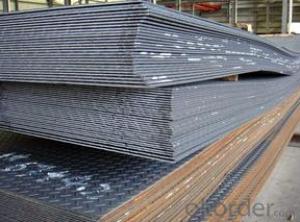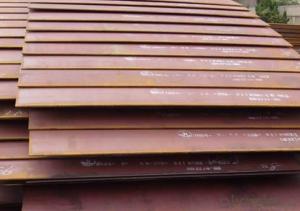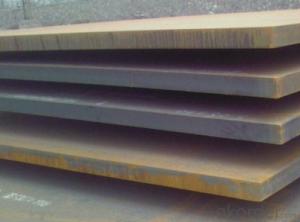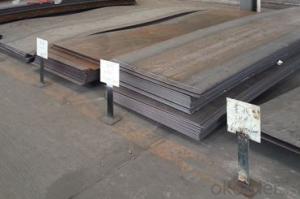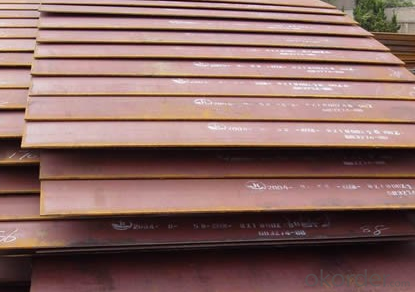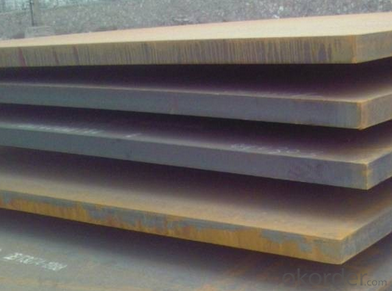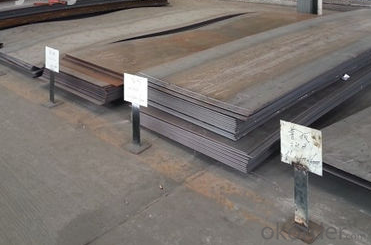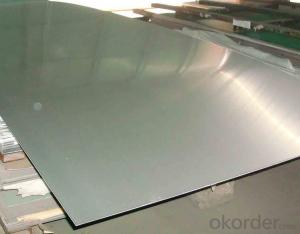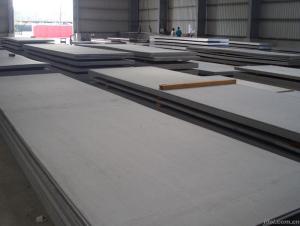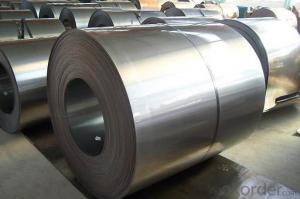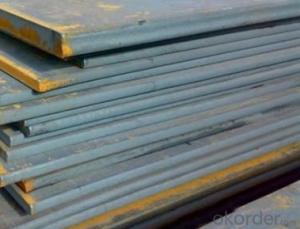Cold Rolled 304L Stainless Steel Sheet E235B CNBM
- Loading Port:
- Qingdao
- Payment Terms:
- TT OR LC
- Min Order Qty:
- 10 pc
- Supply Capability:
- 30 pc/month
OKorder Service Pledge
OKorder Financial Service
You Might Also Like
Quick Details
| Grade: | stainless steel sheet | Standard: | JIS, AISI, ASTM, GB, EN | Length: | 1000-6000mm |
| Thickness: | 0.3-6.0mm cold rolled | Width: | 500-2000mm | ||
| Brand Name: | TISCO | Model Number: | 304 | Type: | stainless steel sheet |
| Application: | construction,decration,foodstuff, gas, metallurgy,biology,chemical,etc | Certification: | SGS | cold rolled finish: | 2B ,BA,Hairline ( brush),No.4 ,8k Mirror |
| hot rolled finish: | No.1 | edge: | raw/mill edge , slit edge | packing: | wooden pallet ,standar export packing |
| inner packing: | interleaving paper | mill test: | quality certification | Inspection: | accept customer inspect |
| Delivery time: | within 5 working days of the stocked grade | Payment term: | T/T or L/C | Quality: | primary quality |
Packaging & Delivery
| Packaging Details: | The packing of 304 steel sheet is wooden packaging;kraft;standard export packaging. |
| Delivery Detail: | The delivery time of 304 steel sheet is within 5 working days |
Specifications
Stainless steel sheet
1.Thickness:0.3-100mm
2.Width:500-3000mm
3.Length:1000-6000mm
4.large stock,short delivery time
Product Description
cold rolled 304 stainless steel sheet
We are suppliers of 304 and 304L Stainless Steel in a wide range of bar, flat, sheet, plate, angle and seamless tubing and pipes.
Stainless steel types 304 and 304L.Type 304 stainless steel material is a kind of common stainless steel materials, corrosion prevention is better than 200 series stainless steel materials. High resistance to high temperature also is better, can to 1000-1
200 degrees. 304 stainless steel has good corrosion and corrosion resistance and good resistance to intergranular corrosion. For oxidizing acid, obtained in the experiment, the concentration of 65% or less under the boiling temperature of nitric acid, 304
stainless steel has a strong corrosion resistance. To most organic and inorganic acid and alkali solution with good corrosion resistance ability.
All stainless stock can be delivered mirror polished if required, Call for details.
Chemistry Data For 304/304L Stainless Steel
304 Stainless Steel | |||||||
Carbon (C) | Manganese (Mn) | Silicon(Si) | Chromium (Cr) | Nickel(Ni) | Phosphorus (P) | Sulfur (S) | Other |
0.08 | 2.0 | 1.0 | 18.00-20.00 | 10.0-14.0 | 0.045 | 0.03 | - |
304L Stainless Steel | |||||||
Carbon (C) | Manganese (Mn) | Silicon(Si) | Chromium (Cr) | Nickel(Ni) | Phosphorus (P) | Sulfur (S) | Other |
0.03 | 2.0 | 1.0 | 17.00-19.00 | 8.0-10.5 | 0.035 | 0.03 | - |
(a) Iron constitutes the remainder. Amounts indicated are maximums or ranges, unless indicated.
Mechanical Data for 304/304L Stainless Steel
Stainless Steel Type | Minimum Tensile Strength (ksi) | Minimum Yield Strength (0.2%, ksi) | Hardnessb |
304 Stainless Steel - Typical Valuesc | 75 | 30 | 88 |
304L Stainless Steel - Typical Valuesc | 70 | 25 | 88 |
- Q: What is the process of galvanizing steel sheets?
- Galvanizing steel sheets involves immersing them in a bath of molten zinc, which creates a protective coating on the surface of the sheets. This process, known as hot-dip galvanization, helps to prevent rusting and corrosion, making the steel more durable and long-lasting.
- Q: What are the different sizes of steel sheets available?
- Steel sheets are available in a wide range of sizes, catering to various applications and industries. The sizes of steel sheets can vary depending on factors such as thickness, width, and length. In terms of thickness, steel sheets are commonly available in gauges ranging from 7 to 30. The higher the gauge number, the thinner the sheet. Thinner sheets, such as those with a gauge of 30, are often used for applications that require flexibility, while thicker sheets, such as those with a gauge of 7, are typically used for heavy-duty applications that require high strength and durability. When it comes to width, steel sheets are available in a range of options. The most common widths include 36 inches, 48 inches, and 60 inches. However, customized widths can be obtained for specific requirements. Regarding length, steel sheets are typically available in standard lengths of 96 inches and 120 inches. These lengths are commonly used in various industries. However, like width, the length can also be customized to fit specific needs. It is important to note that the availability of different sizes of steel sheets may vary depending on the supplier and the specific grade of steel being used. It is advisable to consult with a steel sheet supplier or manufacturer to determine the exact sizes available for a particular application.
- Q: Can the steel sheets be easily folded or creased?
- No, steel sheets cannot be easily folded or creased due to their strong and rigid nature.
- Q: Can steel sheets be used for agricultural fencing or enclosures?
- Indeed, agricultural fencing or enclosures can utilize steel sheets. These sheets possess remarkable durability and exceptional strength, rendering them appropriate for safeguarding livestock and shielding crops. Moreover, they can be shaped into panels or rolls, facilitating effortless installation and customization to accommodate diverse fencing or enclosure requirements. Furthermore, steel sheets exhibit resistance to weathering, corrosion, and pests, guaranteeing enduring performance in agricultural settings. Ultimately, steel sheets emerge as a dependable and efficient option for agricultural fencing or enclosures.
- Q: Can steel sheets be used for noise barriers?
- Indeed, noise barriers can indeed utilize steel sheets. Steel, being a resilient and sturdy substance, can effectively hinder or diminish the propagation of sound waves. Its substantial density and mass aid in the absorption and reflection of sound, thereby impeding its passage through the barrier. It is possible to tailor and produce steel sheets specifically for the purpose of noise reduction, incorporating attributes like perforations or acoustic insulation materials to enhance their efficacy. Moreover, steel sheets can be treated with coatings or paint to bolster their resistance against adverse weather conditions and corrosion. In general, steel sheets present a feasible choice for the construction of noise barriers, particularly in locales with elevated levels of noise pollution.
- Q: How do steel sheets perform in terms of abrasion resistance?
- Steel sheets have excellent abrasion resistance due to their high hardness and toughness, making them highly resistant to wear, scratching, and damage caused by friction or rubbing against other surfaces.
- Q: What are the different grades of steel used for manufacturing sheets?
- The different grades of steel used for manufacturing sheets include low carbon steel, medium carbon steel, high carbon steel, stainless steel, and alloy steel.
- Q: Are steel sheets susceptible to rusting?
- Steel sheets can indeed be prone to rusting. The composition of steel mainly consists of iron, a metal that has a natural tendency to react with oxygen when in contact with moisture, resulting in the formation of iron oxide, commonly referred to as rust. Consequently, when steel sheets come into contact with water or moisture, rusting can occur gradually. Nevertheless, there exist techniques to hinder or decelerate the rusting process, including the application of protective coatings or the utilization of stainless steel. The latter contains elements like chromium that offer supplementary protection against corrosion.
- Q: Can steel sheets be recycled after their useful life?
- Yes, steel sheets can be easily recycled after their useful life. Steel is one of the most recyclable materials in the world and can be melted down and reused multiple times without losing its properties. Recycling steel sheets not only reduces the need for new steel production but also conserves resources and reduces energy consumption and greenhouse gas emissions.
- Q: What is the cost of steel sheets compared to other materials?
- The cost of steel sheets typically varies depending on factors such as size, thickness, and specific type of steel. However, in general, steel sheets tend to be more affordable compared to other materials such as aluminum or titanium.
Send your message to us
Cold Rolled 304L Stainless Steel Sheet E235B CNBM
- Loading Port:
- Qingdao
- Payment Terms:
- TT OR LC
- Min Order Qty:
- 10 pc
- Supply Capability:
- 30 pc/month
OKorder Service Pledge
OKorder Financial Service
Similar products
Hot products
Hot Searches
Related keywords
